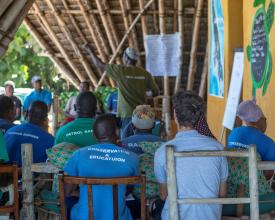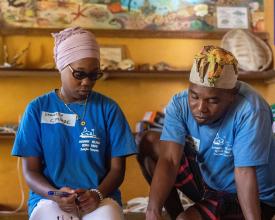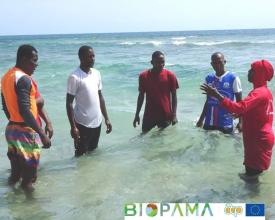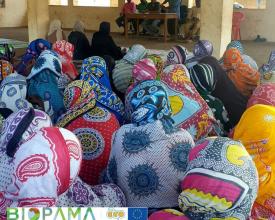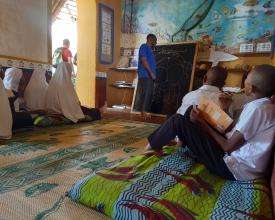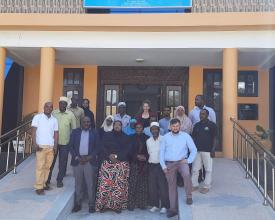
Protéger la réserve naturelle de l'île de Chumbe contre les menaces accrues de braconnage dues à la pandémie de COVID-19, en réaffectant des gardes locaux, en développant les compétences des jeunes pêcheurs et en soutenant ses activités de conservation.
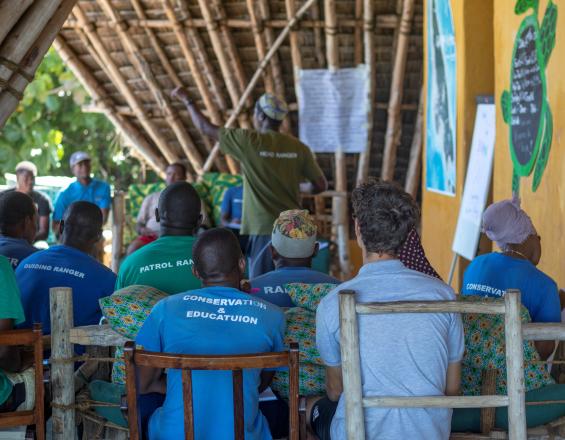
En tant que réserve naturelle à but non lucratif gérée par le secteur privé à Zanzibar, en Tanzanie, le parc corallien de l'île de Chumbe (CHICOP) a été la première aire marine protégée (AMP) financièrement durable au monde, entièrement autofinancée par l'écotourisme depuis près de 30 ans. Pour la première fois dans l'histoire de CHICOP, le modèle de gestion réussi de l'AMP était menacé par un effondrement mondial du secteur du tourisme et une perte de financement due à la pandémie de COVID-19 en 2020 - 2021. Grâce à un fonds d'urgence provenant de la subvention de réponse rapide pour la gestion de la biodiversité et des zones protégées (BIOPAMA) financée par l'Union européenne et l'Organisation des États d'Afrique, des Caraïbes et du Pacifique, CHICOP a veillé à ce que la gestion de la conservation et la protection de la biodiversité sur l'île de Chumbe se poursuivent non seulement pendant la crise du COVID-19, mais aussi en renforçant les relations avec d'autres AMP dans l'archipel et en permettant le développement des compétences des jeunes et des femmes de la région.
Contexte
Défis à relever
Grâce aux vastes programmes de sensibilisation et d'éducation à l'environnement mis en œuvre depuis le début du projet Chumbe (années 1990), presque aucun cas de braconnage n'a été signalé avant l'apparition du COVID-19. La pandémie a toutefois interrompu le tourisme, dont de nombreux habitants de Zanzibar dépendaient pour leurs revenus. L'absence d'autres sources de revenus a entraîné des problèmes écologiques et économiques. Les gardes forestiers du CHICOP ont constaté une augmentation spectaculaire des tentatives de braconnage et de la pression exercée sur les stocks de poissons pour l'alimentation et les revenus. En outre, en raison de la pandémie de COVID-19, la moitié de la main-d'œuvre du CHICOP est passée au travail à domicile et aux congés payés, ce qui a mis en péril la poursuite durable des activités de conservation qui avaient été maintenues pendant près de 30 ans.
Emplacement
Traiter
Résumé du processus
Pour soutenir le projet de conservation avec succès, il est essentiel de sensibiliser et d'encourager des mentalités positives pour la conservation durable de la biodiversité, ce qui peut être réalisé par une sensibilisation et une éducation étendues, ainsi qu'en garantissant l'engagement et l'implication de la communauté à tous les stades. CHICOP met en œuvre des programmes permanents d'éducation environnementale et collabore activement avec les représentants des communautés voisines. Cette approche a permis à l'île de Chumbe de devenir la première AMP financièrement autonome au monde, et de recevoir des acclamations et des récompenses pour ses opérations réussies sur près de trois décennies. La combinaison de programmes d'éducation environnementale durables financés par l'écotourisme et d'un processus décisionnel fondé sur l'engagement des communautés a joué un rôle déterminant dans les réalisations et la reconnaissance du parc.
Blocs de construction
L'éducation à l'environnement basée sur une approche d'éducation au développement durable (EDD)
L'éducation a joué un rôle crucial dans le succès de la protection de la zone marine protégée (ZMP). Avant sa désignation en tant qu'AMP (qui est une zone sans prélèvement à 100 %), le parc était une zone de pêche libre. Pour sensibiliser la population à la fermeture du site dans les années 1990 et l'aider à comprendre l'importance de la conservation et ses avantages, CHICOP a mis en œuvre un vaste programme de sensibilisation et a créé un programme d'éducation à l'environnement (EE) en proposant des expériences pratiques d'éducation à l'environnement aux écoliers locaux, aux enseignants, aux membres de la communauté et aux représentants du gouvernement, programme qui se poursuit encore aujourd'hui.
Facteurs favorables
- Les revenus de l'écotourisme ont été la principale source de financement du programme d'éducation environnementale.
- Les programmes éducatifs ont permis aux communautés locales, aux étudiants et aux étudiants étrangers d'acquérir une expérience pratique.
- Le chef des gardes forestiers, un ancien pêcheur zanzibarien, a dirigé le programme d'éducation des communautés de pêcheurs.
- La participation active de l'équipe de conservation et d'éducation au programme d'éducation à l'environnement.
- Des idées et des connaissances pratiques en matière de conservation de la nature sont partagées, offrant aux communautés de pêcheurs des possibilités d'apprentissage de première main.
Leçon apprise
L'éducation est essentielle pour assurer la pérennité des efforts de conservation. Il est essentiel de changer l'état d'esprit des gens et une éducation environnementale continue est nécessaire. Un atelier d'une journée n'est toutefois pas suffisant, et l'éducation environnementale doit être dispensée de manière constante. Même si l'éducation est continue, elle ne garantit pas un changement de comportement à 100 %, car il se peut que des pêcheurs continuent à se livrer à des activités de pêche illégales. Dans le cas de Chumbe, un mécanisme a été mis en place pour lutter contre ces activités illégales en collaboration avec les autorités gouvernementales et les organismes chargés de l'application de la loi.
Il est recommandé non seulement de maintenir des programmes d'éducation réguliers, mais aussi d'établir des mécanismes appropriés pour gérer les activités de braconnage potentielles. En outre, pour soutenir ces activités, il est conseillé d'explorer des options de financement alternatives plutôt que de dépendre uniquement de ressources financières externes, compte tenu de la possibilité de situations imprévues telles que la récurrence d'une pandémie comme Covid-19. Bien que la subvention de réponse rapide du BIOPAMA ait soutenu le CHICOP, la viabilité à long terme nécessite une prise en compte minutieuse des incertitudes.
Une prise de décision basée sur l'engagement communautaire
Le CHICOP collabore étroitement avec les représentants des communautés voisines, ce qui est facilité par des réunions de village régulières et la création d'un comité consultatif de l'AMP. Le parc s'engage activement auprès des communautés locales pour recueillir leurs commentaires et les intégrer dans les processus de planification et de prise de décision pour la planification et la mise en œuvre d'une gestion adaptative. Un plan de gestion décennal récurrent constitue la base du projet Chumbe (qui en est à sa troisième itération). Les réactions à la planification sont recueillies lors d'entretiens et de réunions en personne, ce qui garantit des canaux de communication ouverts et transparents avec les communautés locales. En outre, en offrant de nombreuses possibilités d'emploi aux communautés locales (à la fois sur l'île et en soutenant une série d'entreprises en dehors de l'île qui contribuent aux opérations de l'île, telles que les produits agricoles durables, la production de savon biologique et autres), Chumbe favorise les avantages mutuels, les moyens de subsistance durables et garantit une forte représentation des considérations des communautés locales dans tous les aspects de la gestion.
Facteurs favorables
- La collecte d'opinions par le biais de réunions régulières avec les villageois et l'engagement de discussions avec les autorités locales, telles que le ministère de l'économie bleue et de la pêche et le département des forêts, est un facteur clé de succès pour assurer la protection de la biodiversité de l'île.
- Le modèle de gestion privée adopté par l'île a apporté des avantages significatifs en matière de gestion, sans générer de conflits d'intérêts entre les différentes parties prenantes ni de changements de priorités de la part du gouvernement.
Leçon apprise
La conservation réussie de l'île de Chumbe ne serait pas possible sans la participation active, l'engagement et le soutien des communautés locales. La contribution directe et la volonté de participer sont des facteurs essentiels de réussite. Il est important de favoriser un environnement ouvert et inclusif où des voix différentes peuvent être entendues et où une compréhension mutuelle peut être établie. En s'engageant activement auprès des communautés locales et en les écoutant, un fort sentiment d'appropriation et de collaboration peut être encouragé, conduisant à des efforts de conservation plus efficaces et plus équitables.
Impacts
- Sauvegarder la biodiversité unique de Chumbe dans le sanctuaire du récif corallien et la réserve forestière fermée, en s'attaquant au risque accru de braconnage de la faune sauvage dû à la pandémie. L'équipe de conservation a été élargie pour assurer des patrouilles quotidiennes, proactives et éducatives et résoudre les problèmes d'empiètement. Les programmes d'éducation à l'environnement se sont poursuivis avec la participation de plus de 400 pêcheurs de 12 villages de pêche d'Unguja.
- Préservation de l'importante fonction de Chumbe en tant que zone d'alevinage, au bénéfice des communautés de pêcheurs, par le biais d'un effet d'entraînement et du repeuplement des zones de pêche adjacentes. Bien que de nombreuses activités économiques se soient effondrées pendant la pandémie de COVID-19, les communautés de pêcheurs des environs ont maintenu leurs moyens de subsistance en continuant à pêcher dans les zones non protégées.
- Développement des compétences de 10 jeunes locaux, avec des stages de six mois pour deux jeunes héros des océans, tout en permettant à une jeune femme zanzibarienne de devenir la première femme garde forestier formée à Zanzibar. Tous les stagiaires ont participé à des travaux de conservation et d'éducation, et ont entrepris des activités de guidage pendant cette période, formés et supervisés sur place par le chef des gardes forestiers.
- CHICOP a organisé un premier symposium des gardes forestiers sur le thème "Par les gardes forestiers - pour les gardes forestiers", qui a permis de renforcer les relations avec d'autres zones de conservation marine à Zanzibar. Le symposium a également facilité la création d'un forum des rangers de Zanzibar sur WhatsApp, avec 22 membres des cinq aires marines de conservation d'Unguja.
Bénéficiaires
- Moyens de subsistance des communautés locales de pêcheurs grâce à la préservation des ressources
- L'équipe de conservation CHICOP
- Jeunes locaux formés comme gardes forestiers
- Individus locaux grâce à des opportunités d'emploi
- Locaux, secteurs publics, ONG et étudiants internationaux
